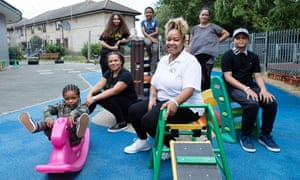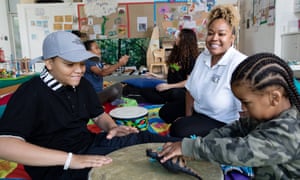
When Nicola Dady was diagnosed with an aggressive form of kidney and bladder cancer, her first thought was not of herself but her children.
“My first feeling was, oh my God, what’s going to happen to them,” says Dady, a Londoner and single mother to two small children. “All I could think about was them. I didn’t want to die before my kids know who I am. Corey was only three at the time, and I thought if I die he’s not going to remember me at all.”
She embarked on chemotherapy, with a poor prognosis of surviving more than five years. While she was in hospital, her children stayed with friends and relatives, but she felt terrible guilt when she realised her illness, and her absence, was taking an emotional toll on them.
“I’m a single parent so we spent all of our time together, I was everything to them.” They felt sad and confused, she says. “Shenai became really clingy. I’d drop her off at school, she would go in and run back out again and say ‘bye mummy, I love you’, then she’d go in and run back out again. She always felt that would be the last time she’d see me.”
Dady approached social services and charities to see what support they offered children with a parent or carer with cancer. She was given leaflets, but could not find what she was looking for.
“Most organisations support people with cancer or children with cancer but there’s very limited support of children with a parent with cancer. I was so surprised. I thought, if my kids are suffering, there must be hundreds of kids who are suffering,” she says.
She knew it would help Corey and Shenai to meet others in a similar position.
So in 2012, she set up a charity, Don’t Forget the Kids, with funding from the Big Lottery Fund, to support children dealing with the trauma of being bereaved or having a loved one with cancer. Six years on, she regularly fields enquiries for copycat ventures across England, Scotland and even California.

Families take part in “meaningful” arts and crafts that help them to learn more about each other. This might be guessing each other’s favourite films, for example, or drawing family trees. It is also a way for parents, who may not live to see their children grow up, to pass on their values. There are activities involving music and poetry, with the aim of creating positive memories and enjoying some “guilt-free fun”.
The group meets regularly in a bright, spacious room at Broadwaters Children’s Centre in Tottenham, north London.
“When they [the children] first come they don’t know what to expect,” says Dady. “They’re having massive changes at home so they’re very quiet usually and withdrawn. Or you might find with boys they might be over-boisterous. We just embrace them. We don’t force them to get involved in arts and crafts […] but slowly you’ll see them coming over and join in.”
Gemma Hall took her young brother James along after their mother died of liver cancer five years ago. James was nine at the time and did not want counselling.
“At first he didn’t show much emotion,” says Hall, who has special guardianship of her brother. “It’s deep-rooted, he’s put her in a box and locked it away. I was very cautious of his feelings, of trying to get him to talk and be open with his emotions because I didn’t want him to hold it in and become angry.” Dady, who knew the family, suggested they come to the group.
“Coming here allowed him to express his emotions, not necessarily through talking because he wasn’t quite at the age where he could express it verbally, so he would do different activities,” says Hall. “It really helped him. He was with other children who had experienced similar things so he didn’t feel so alone.”
The charity provides peer support but is not a counselling service, says Dady. The children are under no pressure to discuss their experiences, but “if they want to talk about stuff, it’s a safe environment for them to do so”.
Two years ago Dady received a Winston Churchill Memorial Trust fellowship, a special grant to travel around the US to research creative ways of helping children through bereavement – and in June she was awarded the fellowship’s Viscount De L’Isle award for her determination to succeed to help others.
There have been challenges, she admits. Some people are reluctant to discuss their cancer diagnosis with their children and this can stop them coming to the group.
However, with new enquiries each week there are plans to expand and launch another three groups across London, as well as to run trips away for families. Dady visited the Avery Center in Chino Hills, California, which offers therapy for people who have suffered a traumatic experience, such as the death of a loved one.
“They’ve expressed an interest in starting a Don’t Forget the Kids out
there in California,” says Dady, who is looking into how that could work.
It is eight years since Dady was diagnosed. She had been told there was an 80% chance the cancer would come back within five years, but it did not and she is in remission.
While Don’t Forget the Kids began as a way to comfort her own children, it has turned into a broader mission for Dady.
Her experience, she says, has given her a purpose that she lacked before. She has published two books and recently finished a screenplay. “We need to live our best life,” she says. “I’m grateful for my cancer experience because it woke me up.”
source:-theguardian